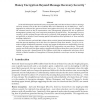Free Online Productivity Tools
i2Speak
i2Symbol
i2OCR
iTex2Img
iWeb2Print
iWeb2Shot
i2Type
iPdf2Split
iPdf2Merge
i2Bopomofo
i2Arabic
i2Style
i2Image
i2PDF
iLatex2Rtf
Sci2ools
IACR
2016
2016
Honey Encryption Beyond Message Recovery Security
Juels and Ristenpart introduced honey encryption (HE) and showed how to achieve message recovery security even in the face of attacks that can exhaustively try all likely keys. This is important in contexts like password-based encryption where keys are very low entropy, and HE schemes based on the JR construction were subsequently proposed for use in password management systems and even long-term protection of genetic data. But message recovery security is in this setting, like previous ones, a relatively weak property, and in particular does not prohibit an attacker from learning partial information about plaintexts or from usefully mauling ciphertexts. We show that one can build HE schemes that can hide partial information about plaintexts and that prevent mauling even in the face of exhaustive brute force attacks. To do so, we introduce target-distribution semantic-security and target-distribution non-malleability security notions. We prove that a slight variant of the JR HE constr...
Biometrics | IACR 2016 |
| Added | 03 Apr 2016 |
| Updated | 03 Apr 2016 |
| Type | Journal |
| Year | 2016 |
| Where | IACR |
| Authors | Joseph Jaeger, Thomas Ristenpart, Qiang Tang |
Comments (0)

